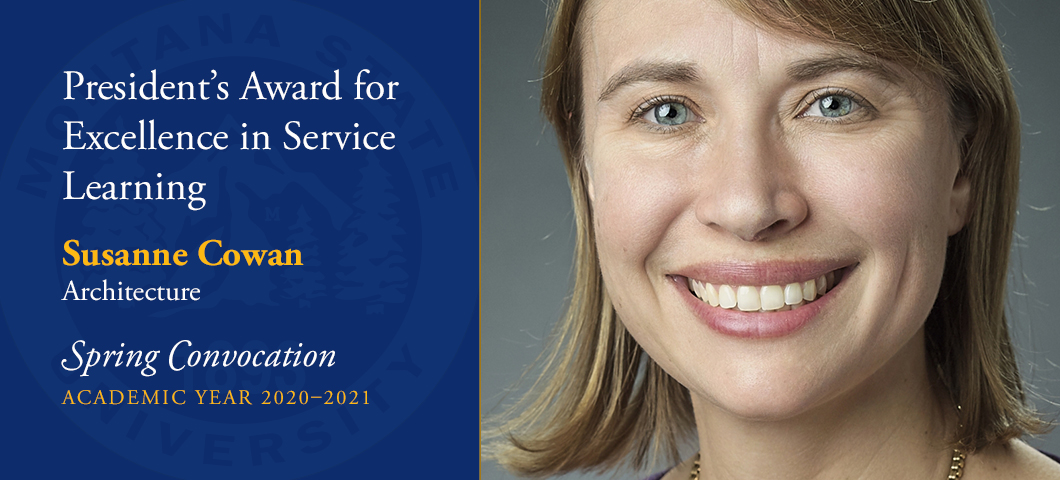President's Excellence in Service Learning Award

Susanne Cowan
Susanne Cowan, a professor of architecture and urbanism in the MSU School of Architecture in the College of Arts and Architecture, will receive the President’s Award for Excellence in Service Learning. The award carries a cash award of $1,000.
Cowan, who came to MSU in 2014, researches the relationship between urban design and the social conditions of cities. In particular, she studies the impact of participatory democracy and community organizing on neighborhood planning.
This emphasis was demonstrated in a service-learning project that Cowan conducted during the past year in which students in three classes learned research processes and procedures by researching trail use in Bozeman neighborhoods. Each student counted users and distributed written surveys at trails throughout the community, including the Gallagator Trail, the Westside Trial, Bozeman Pond and Sourdough Creek. The surveys asked questions about who was using the trails, how they were using the trails and what improvements they would like.
The students combined their survey data, analyzed the results, and developed design or policy intervention suggestions to improve connectivity, wayfinding and safety on the trails. The survey identified that longer, more connected trails and better maintenance were the two largest priorities for improving the trail system. The surveys also identified that better surfaces and wider paths would be useful in the trails in the growing northwest quarter of Bozeman.
Cowan and her research assistant, Larissa Morales, published the results in an 80-page booklet that they distributed to the Gallatin Valley Land Trust and the city of Bozeman Parks and Recreation Department. The outcomes were also presented at a Western Transportation Institute webinar. The city and the GVLT said the data reinforced what they already suspected about the need for trail connectivity. In October, the groups approved construction of new trail segments to improve east-west connectivity in two new projects for a Front Street Connector Trail and the West Side Pathways and Trails Connection Project.
According to Ralph Johnson, director of the MSU School of Architecture, the projects fulfilled a dual purpose. The students said they found the research highly motivating and rewarding, and the information provided met the expectations of the community partners. Additionally, the courses also fulfilled significant components of the School of Architecture’s National Architectural Accrediting Board’s required learning outcomes, he said.
“Thus the teaching of these courses in service-learning met MSU’s land-grant mission, provided scholarly research that was helpful to both a nonprofit and city agency that they would not otherwise have been capable of gathering, as well as providing an important experience to the students in the course,” Johnson said.
